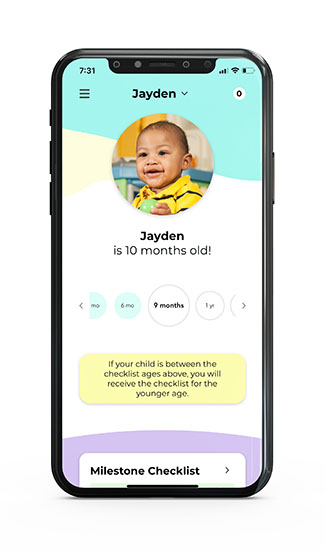Early Intervention
Ohio Early Intervention
If your child is not meeting a milestone, or is experiencing significant delays, the Ohio Early Intervention (EI) program is a statewide system that provides coordinated services to parents of children ages 0-3 with disabilities or developmental delays.
EI is grounded in the philosophy that young children learn best from familiar people in familiar settings. That is why your local EI team, which includes a service coordinator and service providers, works with you in your home or other places where you and your family spend time to develop a coordinated plan.
EI provides support and resources to assist parents and caregivers that enhance children’s learning and development through everyday routines. It is a collaborative home and community-based system where families and an EI team work together to provide ongoing support to your child. The intervention team gathers information to determine a child’s eligibility and need for early intervention services, provides service coordination to ensure the protection of family and child rights, promotes advocacy and coordinate services, and partners with parents and other caregivers to support children as they learn and grow and focuses on enhancing child participation in existing and desired family, community and early childhood experiences.
It is recommended that parents complete a screening for their child at ages 2, 4, 6, 9, 12, 15, 18, 24 and 30 months, 3 years, 4 years and 5 years. The screening is free and takes the guesswork out of determining if your child is missing developmental milestones. Learn more about milestones through the CDC Act Early initiative.
Early Head Start (children ages 0-3) – Early Head Start (EHS) programs serve infants and toddlers under the age of 3 and pregnant women. EHS programs provide intensive comprehensive child development and family support services to low-income infants and toddlers, their families, and to pregnant women and their families.
The Office of Special Education Programs (OSEP) and the Office of Head Start (OHS) jointly developed this resource to support programs that promote the inclusion of infants with significant disabilities and their families.
A significant disability in infancy refers to a specific developmental or medical condition experienced by an infant, from birth to 12 months. Significant disabilities in infancy can lead to developmental delays that increase over time and may interfere with the infant’s acquisition of knowledge and skills needed for independence.
Infants with significant disabilities may require intensive individualized support to fully participate in daily experiences at home, in their communities, or an early care and education program. Early Head Start (EHS) programs offer this support, in careful and collaborative planning with families.
Importantly, the program promotes the physical, cognitive, social, and emotional development of infants and toddlers through safe and developmentally enriching caregiving. This prepares these children for continued growth and development and eventual success in school and life.
EHS programs also mobilize the local community to provide the resources and environment necessary to ensure a comprehensive, integrated array of services and support for children and families.
Head Start (children ages 3-5) is a federally funded school readiness program for children, ages 3-5. Head Start provides services to eligible children and families in early learning, health, and family well-being, while engaging parents and guardians as partners. Head Start includes preschool programs that serve these children.
Who is eligible? Children from low-income families, in foster care or experiencing homelessness, and children with developmental disabilities are eligible to be considered for participation. At least 10% of a program’s enrollment must be children with disabilities.
Head Start programs offer a variety of service models, depending on the local community’s needs. Head Start programs may be in schools, childcare centers, and family childcare homes. Some programs also offer home-based services where a Home Visitor conducts weekly visits to children in their own home and works with the parent as the child’s primary teacher.
Head Start includes Preschool Special Education for children ages 3-5 with disabilities.
To meet individual children’s needs, districts offer a variety of preschool special education services. Children with disabilities may receive services in public schools, private preschools, or childcare centers.
For additional information on service providers in Ohio, visit the Early Care & Education Search Portal. This system will help you locate the type of early care and education program that meets your needs. You also can learn more about programs’ licensing status, Step Up To Quality rating, and inspection results.

